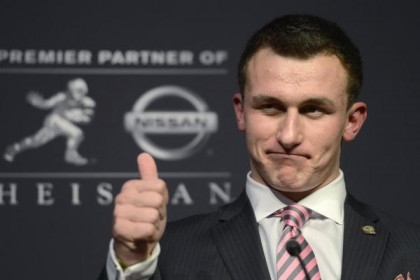Johnny Manziel is under fire from the NCAA for selling his autograph, and it’s ridiculous. Texas A&M’s sophomore quarterback, fresh off the greatest rookie season in football history, has endured scorn from the governors of amateur athletics and a legion of uptight sportswriters, groups that reveled in Manziel’s build-up and now smile on his potential downfall. The spirit of amateurism is at risk, with Manziel the dastardly culprit.
It’s a prime example of the moral indignation that fuels shoddy sports analysis, and the inconsistency with which this indignation is applied. It’s clips like this that are the problem. Tweets like this one, too. Manziel’s football accolades are impenetrable, but something about his conduct irks the crusty sportswriting elite, so they attack his actions away from the game and insist they have something to do with football. The problem, of course, is that they don’t.
Manziel’s prodigious list of accomplishments – starting at quarterback in the SEC as a redshirt freshman; becoming the first freshman to win the Heisman Trophy; thrusting A&M into the national championship discussion – is primarily the result of his individual merits and abilities. Somehow, compared to his school, the NCAA and the sports-writing contingent so intent on tearing him down, Manziel stands to benefit the least.
He can’t yet secure an NFL contract, since players must be at least three years removed from high school to enter the amateur draft. If he’s suspended for selling autographs, he can’t leave college early, since this year’s NFL supplemental draft – which allows players who develop eligibility issues to unilaterally turn pro – has already passed.
If he’s forced to sit out the collegiate season, then declares for the draft, his standing will undoubtedly slip in the eyes of NFL scouts, the type of men conditioned to value “intangibles” and “character” over a historic MVP season – things you can’t measure over the success in plain sight. Unlike his peers in other sports, who can ply their trade in various minor leagues or bypass school earlier to turn pro, Manziel is still the NCAA’s property for another year, with emphasis on the word property.
Manziel doesn’t fit the ideal mould of All-American quarterback with a squeaky-clean reputation. (It’s unclear if this ideal mould of athlete exists anywhere outside of the fantasies of tut-tutting columnists.) He juked, scrambled and gunned his way to the Heisman, then voiced a few unpopular opinions on Twitter. He’s a 20 year-old kid suddenly thrust into mega-stardom, one that likes to party and regularly turns to Drake for advice on how to cope. Quarterbacks, like other humans, don’t exist in a bubble; for certain analysts to expect that of Manziel is childish and absurd.
It’s just another example of modern sports culture lowering the denominator, embracing vapid debate and translating unwarranted outrage into attention. With nothing else to talk about during the summer, an amateur athlete, one that generates millions of dollars for his school and the national association that presides above him, daring to sign a few autographs for money becomes the latest scandal du jour. We skim over professionals that commit actual crimes – seriously, the uproar from the Denver incidents paled in relation to this – then dogpile on a college superstar capitalizing on his hype.
If Washington Nationals phenom Bryce Harper, who’s six weeks older than Manziel, sold his autograph at market value, nary an eyebrow would be raised (though scandal-mongers would still whine about his hair and fiery attitude). Manziel plays football, not baseball, and with rules prohibiting him from chasing a pro contract, selling memorabilia is suddenly an affront against society. The rules that exist to defend amateurism – an outdated, exploitative concept that only protects the interests of the NCAA’s corrupt bourgeoisie – are terrible. The moral righteousness of those condemning Manziel might be worse.

